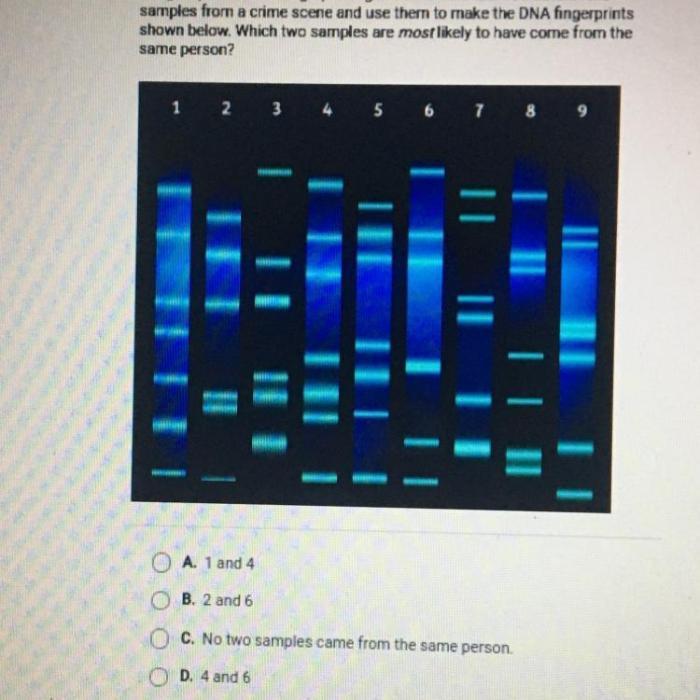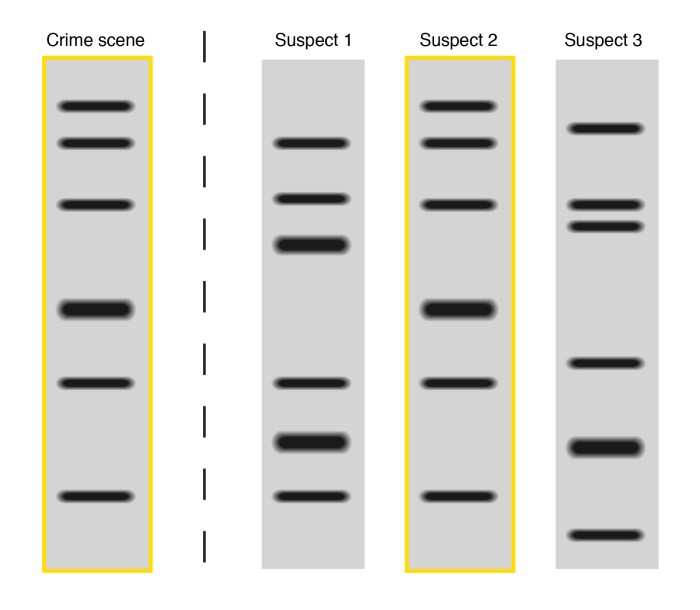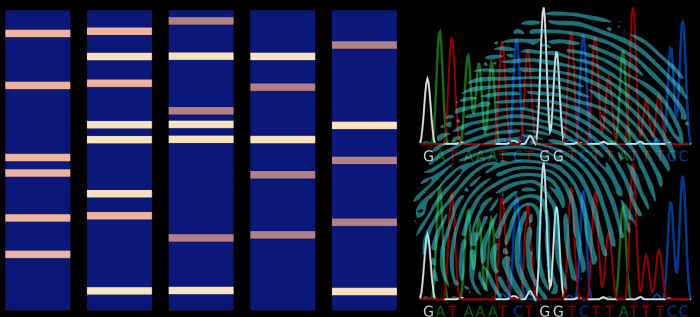Imagine you do DNA fingerprinting in a forensics lab apex, where cutting-edge technology and meticulous analysis converge to unravel the mysteries of crime scenes. As a forensic scientist, you possess the expertise to decipher the genetic code, unlocking the secrets held within DNA samples.
DNA fingerprinting, a groundbreaking technique in forensic science, has revolutionized the field of criminal investigation. By analyzing the unique genetic patterns of individuals, we can identify suspects, exonerate the innocent, and establish familial relationships with unparalleled accuracy.
DNA Fingerprinting in Forensics: Imagine You Do Dna Fingerprinting In A Forensics Lab Apex

DNA fingerprinting is a technique used in forensic investigations to identify individuals based on their unique DNA profile. It involves analyzing specific regions of an individual’s DNA, known as short tandem repeats (STRs), which vary from person to person.
DNA fingerprinting has numerous applications in forensic science, including:
- Identifying suspects and victims in criminal cases
- Excluding individuals from suspicion
- Establishing paternity and other familial relationships
- Investigating cold cases
The process of DNA fingerprinting involves several steps:
- Sample collection:Biological samples, such as blood, saliva, or hair, are collected from individuals.
- DNA extraction:DNA is extracted from the samples using chemical and mechanical methods.
- Analysis:The extracted DNA is amplified and analyzed using PCR (polymerase chain reaction) and electrophoresis to determine the STR patterns.
DNA fingerprinting is a highly accurate and reliable technique, with a very low probability of error. However, it also has some limitations:
- It can be expensive and time-consuming.
- It requires a sufficient amount of DNA for analysis.
- It can be challenging to obtain DNA from degraded or contaminated samples.
Apex Technology in DNA Fingerprinting
Apex technology is a recent advancement in DNA fingerprinting that offers several advantages over traditional methods.
- Faster and more efficient:Apex technology can analyze DNA samples much faster than traditional methods, reducing the time required for forensic investigations.
- Higher sensitivity:Apex technology can detect and analyze smaller amounts of DNA, making it more suitable for cases with degraded or contaminated samples.
- Lower cost:Apex technology is more cost-effective than traditional DNA fingerprinting methods, making it more accessible for forensic laboratories.
Apex technology has numerous potential applications in forensic science, including:
- Crime scene analysis: Apex technology can be used to rapidly identify suspects and victims from trace DNA evidence.
- Paternity testing: Apex technology can provide accurate and reliable paternity testing results, even with limited or degraded DNA samples.
- Database searching: Apex technology can be used to search large DNA databases for matches, helping to identify suspects and solve cold cases.
Case Studies and Applications
DNA fingerprinting has been successfully used in numerous forensic investigations, leading to the identification of suspects, exoneration of innocent individuals, and the resolution of cold cases.
One notable case is the O.J. Simpson trial, where DNA fingerprinting played a crucial role in establishing Simpson’s guilt. The DNA evidence presented in court proved that blood found at the crime scene matched Simpson’s DNA profile, ultimately leading to his conviction.
Another example is the Golden State Killer case, where DNA fingerprinting was used to identify Joseph James DeAngelo as the suspect after decades of unsolved crimes. DeAngelo was linked to 13 murders, 51 rapes, and numerous other crimes through DNA evidence, leading to his arrest and conviction.
DNA fingerprinting has also been used to exonerate innocent individuals who were wrongly convicted of crimes. In one case, a man named Kirk Bloodsworth was sentenced to death for a murder he did not commit. After spending nine years on death row, DNA fingerprinting proved his innocence, and he was released from prison.
Ethical and Legal Implications, Imagine you do dna fingerprinting in a forensics lab apex
The use of DNA fingerprinting in forensic science raises several ethical and legal considerations:
- Privacy concerns:DNA fingerprinting can reveal sensitive information about an individual’s genetic makeup, raising concerns about the potential misuse of this information.
- Discrimination:DNA fingerprinting can be used to discriminate against individuals based on their genetic characteristics.
- Consent:It is important to obtain informed consent from individuals before collecting their DNA for forensic analysis.
To address these concerns, legal frameworks have been established to regulate the use of DNA fingerprinting in forensic science. These frameworks typically include provisions for protecting individual privacy, preventing discrimination, and ensuring informed consent.
Quick FAQs
What is the principle behind DNA fingerprinting?
DNA fingerprinting relies on the analysis of specific regions of DNA known as short tandem repeats (STRs). These STRs exhibit variations in their number of repeats, creating unique patterns that can distinguish individuals.
How is DNA fingerprinting used in forensic investigations?
DNA fingerprinting plays a crucial role in identifying suspects, exonerating the innocent, establishing familial relationships, and investigating missing persons cases.
What are the advantages of using Apex technology in DNA fingerprinting?
Apex technology offers several advantages, including faster processing times, higher accuracy, and the ability to analyze smaller DNA samples.


